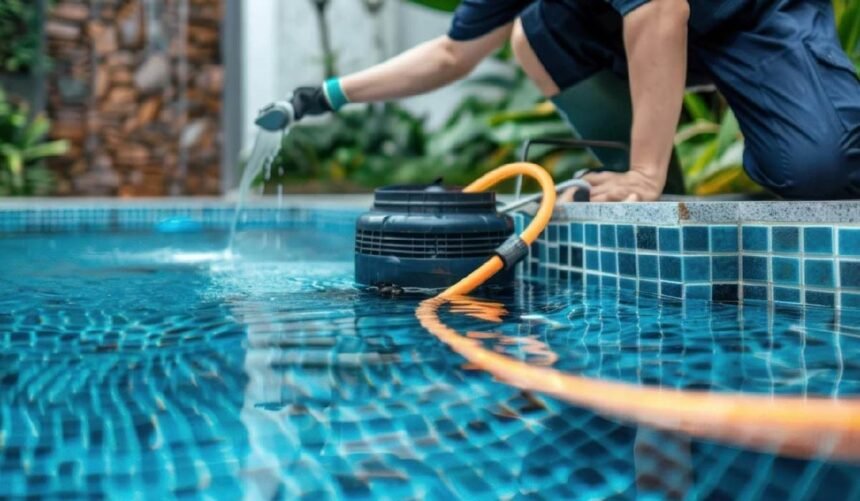A clean pool is the centerpiece of a relaxing and enjoyable outdoor space. However, maintaining a pristine swimming pool requires more than just occasional skimming or adding chemicals. Proper pool cleaning is essential to ensure clear water, prevent algae buildup, and maintain a healthy swimming environment.
Whether you’re a new pool owner or have been maintaining your pool for years, understanding the fundamentals of pool cleaning will help you save time, reduce costs, and keep your pool inviting. This guide covers everything from the basics of pool maintenance to the tools, techniques, and tips for comprehensive pool cleaning.
Why Pool Cleaning Is Crucial
Many pool owners underestimate the importance of regular and thorough pool cleaning. Beyond just aesthetic appeal, clean pool water is vital for health and safety reasons.
Health and Safety
Dirty pool water can harbor bacteria, algae, and other harmful microorganisms that cause skin irritations, respiratory issues, and infections. Effective pool cleaning helps eliminate contaminants and keeps swimmers safe.
Equipment Longevity
A neglected pool clogs filters, damages pumps, and reduces the lifespan of pool equipment. Regular cleaning ensures everything runs smoothly and avoids costly repairs.
Water Clarity
No one wants to jump into a cloudy or green pool. Pool cleaning removes debris, prevents algae growth, and balances chemicals to keep water crystal clear.
The Essentials of Pool Cleaning
Pool cleaning is a multi-step process involving several key tasks. Let’s break down the essential elements of pool cleaning you should incorporate into your routine.
1. Skimming and Removing Debris
One of the first steps in pool cleaning is skimming the surface to remove leaves, bugs, and floating debris. Using a hand skimmer or leaf net regularly prevents debris from sinking to the bottom and clogging your filtration system.
2. Brushing Pool Surfaces
Algae and dirt tend to cling to pool walls, steps, and floors. Brushing these surfaces with a pool brush loosens grime and prevents buildup, making it easier for the filtration system to capture it.
3. Vacuuming the Pool
Vacuuming is an essential part of pool cleaning that targets debris and dirt settled on the pool floor. Whether using a manual vacuum or an automatic robotic cleaner, this step is crucial for thorough cleaning.
4. Cleaning the Pool Filter
Your pool filter traps dirt, oils, and other contaminants. Regularly backwashing sand or DE filters and cleaning cartridge filters helps maintain water clarity and efficiency.
5. Balancing Water Chemistry
While technically part of pool maintenance, balancing chemicals ties closely to cleaning. Proper pH levels, chlorine, alkalinity, and stabilizers prevent algae growth and keep the water sanitized.
Tools and Equipment Needed for Effective Pool Cleaning
To keep your pool spotless, having the right tools is important. Here are some common pool cleaning tools every pool owner should consider:
- Skimmer Net: For removing surface debris.
- Pool Brush: Designed to scrub walls and steps without damaging surfaces.
- Vacuum Cleaner: Manual, automatic, or robotic vacuums help clean pool floors.
- Telescopic Pole: Attaches to brushes and nets to reach all areas.
- Water Testing Kit: To monitor chemical balance.
- Filter Cleaner: Products or tools for cleaning pool filters.
- Algae Remover: Specialized chemicals to target algae blooms.
How Often Should You Perform Pool Cleaning?
The frequency of pool cleaning depends on several factors, including pool size, usage, weather conditions, and surrounding environment. Here’s a general guideline:
- Daily: Skim debris from the surface.
- Weekly: Brush walls and vacuum the pool.
- Biweekly: Clean or backwash the pool filter.
- Monthly: Check and balance water chemistry thoroughly.
Frequent cleaning prevents minor issues from becoming major problems and keeps the pool in prime condition.
Tips for Maintaining a Clean Pool Year-Round
Effective pool cleaning is about consistency and care. Here are some expert tips to maintain your pool’s cleanliness throughout the year:
1. Keep the Surrounding Area Clean
Regularly sweeping patios, trimming nearby trees, and clearing debris helps reduce the amount of dirt and leaves entering the pool.
2. Use a Pool Cover
When not in use, covering your pool prevents debris accumulation and reduces evaporation, helping maintain water balance.
3. Shock the Pool Periodically
Shocking your pool with a high dose of chlorine helps eliminate contaminants and algae that normal sanitizers may miss.
4. Maintain Proper Circulation
Ensure your pool pump and filtration system run efficiently and for adequate periods daily to circulate and filter water.
5. Schedule Professional Cleaning
Even with regular DIY cleaning, consider hiring professionals for deep cleaning services periodically. They can tackle hard-to-reach areas and provide expert chemical balancing.
Common Pool Cleaning Challenges and How to Overcome Them
Pool owners sometimes face stubborn issues despite routine cleaning. Here are some common challenges and solutions:
Algae Growth
If your pool water turns green or develops slimy patches, algae may be the culprit. Regular brushing, shock treatments, and maintaining proper chlorine levels usually prevent this.
Cloudy Water
Cloudiness often results from imbalanced chemicals, poor filtration, or debris buildup. Testing water chemistry and cleaning filters can restore clarity.
Stains and Scale
Mineral deposits and stains can mar pool surfaces. Using specialized cleaners and acid washes (performed by professionals) can effectively remove them.
Equipment Malfunctions
Clogged or malfunctioning pumps and filters reduce cleaning effectiveness. Routine equipment inspections and maintenance prevent breakdowns.
The Benefits of Hiring Professional Pool Cleaning Services
While many pool owners manage basic maintenance themselves, professional pool cleaning services offer distinct advantages:
- Expert Knowledge: Professionals can identify underlying issues that amateurs might miss.
- Advanced Equipment: Commercial-grade tools provide deeper cleaning.
- Time Savings: Outsourcing cleaning frees up your time.
- Preventive Maintenance: Professionals can spot early signs of wear or damage.
- Customized Plans: Tailored cleaning schedules fit your pool’s specific needs.
Regular professional cleanings complement your own efforts and help maintain the pool’s longevity.
Conclusion
Maintaining a clean and healthy pool environment requires consistent and thorough pool cleaning. By understanding the essential cleaning steps, investing in proper tools, and following a regular schedule, you can enjoy sparkling, safe water year-round.
Whether you choose to tackle cleaning yourself or hire professionals for periodic deep cleans, prioritizing pool cleaning is the key to preserving your investment and enhancing your outdoor living experience. Clean pools aren’t just more attractive—they’re safer and more enjoyable for everyone.









